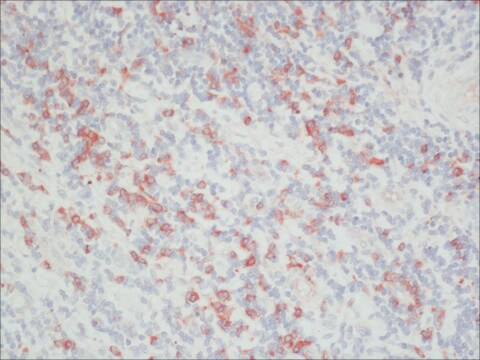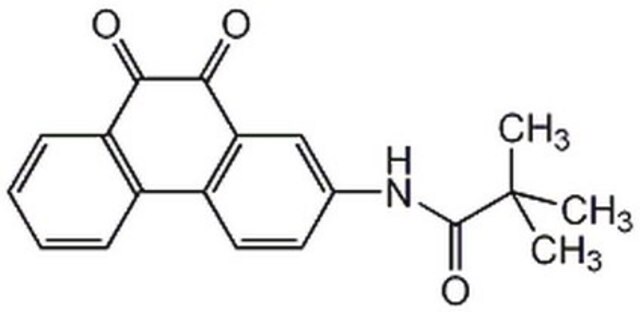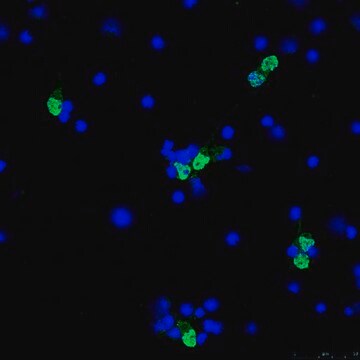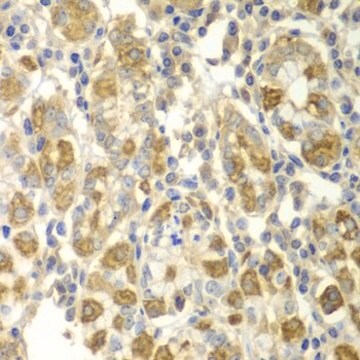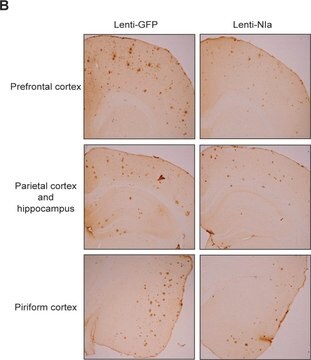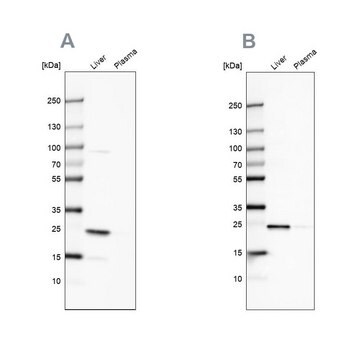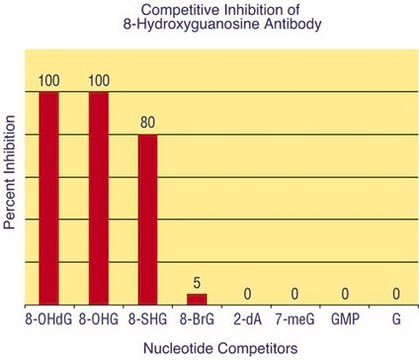MABC87
Anti-CD148/DEP-1 Antibody, clone Ab1 (Azide Free)
clone Ab 1, from mouse
Synonym(s):
CD148, DEP-1, Receptor-type tyrosine-protein phosphatase eta, Protein-tyrosine phosphatase eta, R-PTP-eta, Density-enhanced phosphatase 1, DEP1, HPTP eta, Protein-tyrosine phosphatase receptor type J, R-PTP-J
About This Item
Recommended Products
biological source
mouse
Quality Level
antibody form
purified immunoglobulin
antibody product type
primary antibodies
clone
Ab 1, monoclonal
species reactivity
human, mouse
technique(s)
immunohistochemistry: suitable (paraffin)
immunoprecipitation (IP): suitable
inhibition assay: suitable
western blot: suitable
isotype
IgG1κ
NCBI accession no.
UniProt accession no.
shipped in
wet ice
target post-translational modification
unmodified
Gene Information
human ... PTPRJ(5795)
General description
Immunogen
Application
Apoptosis & Cancer
Apoptosis - Additional
Western Blot Analysis: A representative lot of this antibody detected CD148/DEP-1 in Mouse kidney lysates (Takahashi, T., et al., (2006) Blood. 108:1234-1242).
Immunohistochemistry Analysis: A 1:50 dilution of a representative lot detected CD148/DEP-1 in Epithelial Cells of human prostate tissue.
Immunohistochemistry Analysis: A representative lot of this antibody detected CD148/DEP-1 in frozen mouse embryos. (Takahashi, T., et al., (2003) MOLECULAR AND CELLULAR BIOLOGY. 23(5):1817–1831).
Immunohistochemistry Analysis: A representative lot of this antibody detected CD148/DEP-1 in various mouse tissues such as kidney, cortex and cornea. (Takahashi, T., et al., (2006) Blood. 108:1234-1242).
Inhibition Assay: A representative lot of this antibody inhibited proliferation of HRMEC′s (Primary human renal microvascular endothelial cells) (Takahashi, T., et al., (2006) Blood. 108:1234-1242).
Immunoprecipitation Analysis: A representative lot of this antibody immunoprecipitated CD148/DEP-1 from Huvec and RMEC cell lysates (Takahashi, T., et al., (1999) J. Am. Soc. Nephrol. 10: 2135–2145).
Quality
Western Blotting Analysis: 0.5 µg/mL of this antibody detected CD148/DEP-1 in 10 µg of HeLa cell lysate.
Target description
This protein is highly glycosylated and may run higher than the calculated molecular weight of 146 kDa (isoform 1) or 57 kDa (isoform 2). Uncharacterized bands may be observed in some lysates.
Physical form
Storage and Stability
Handling Recommendations: Upon receipt and prior to removing the cap, centrifuge the vial and gently mix the solution. Aliquot into microcentrifuge tubes and store at -20°C. Avoid repeated freeze/thaw cycles, which may damage IgG and affect product performance.
Other Notes
Disclaimer
Not finding the right product?
Try our Product Selector Tool.
Storage Class
12 - Non Combustible Liquids
wgk_germany
WGK 2
flash_point_f
Not applicable
flash_point_c
Not applicable
Certificates of Analysis (COA)
Search for Certificates of Analysis (COA) by entering the products Lot/Batch Number. Lot and Batch Numbers can be found on a product’s label following the words ‘Lot’ or ‘Batch’.
Already Own This Product?
Find documentation for the products that you have recently purchased in the Document Library.
Our team of scientists has experience in all areas of research including Life Science, Material Science, Chemical Synthesis, Chromatography, Analytical and many others.
Contact Technical Service